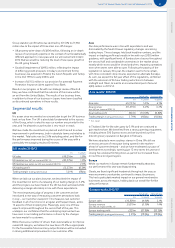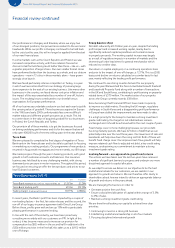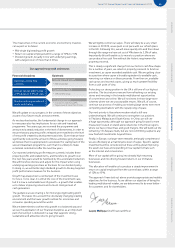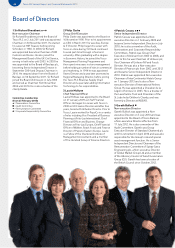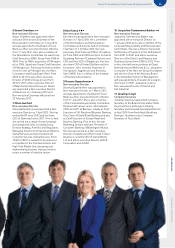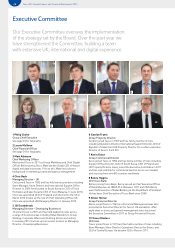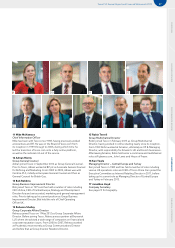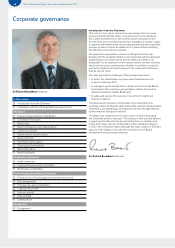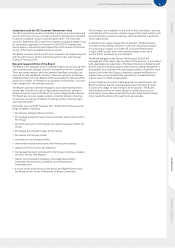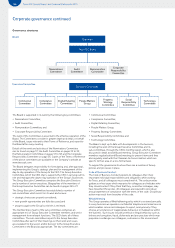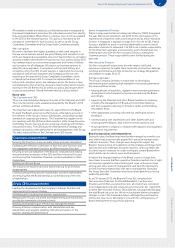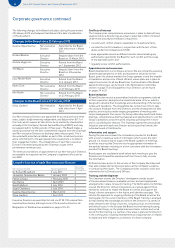Tesco 2013 Annual Report Download - page 35
Download and view the complete annual report
Please find page 35 of the 2013 Tesco annual report below. You can navigate through the pages in the report by either clicking on the pages listed below, or by using the keyword search tool below to find specific information within the annual report.
31
Tesco PLC Annual Report and Financial Statements 2013
OVERVIEW BUSINESS REVIEW PERFORMANCE REVIEW GOVERNANCE FINANCIAL STATEMENTS
All complaints made are treated as confidential and are investigated by
the relevant department and where the individual provides their identity,
they are kept updated. Where there is a serious issue, it will be escalated
to the CEO of the relevant business. This policy is monitored by the
compliance committees in each business, as well as by the Group
Compliance Committee and the Group Audit Committee annually.
Anti-corruption
We seek to maintain the highest standards of ethics and integrity in
the way we do business around the world. Bribery and corruption in all
forms are illegal and unacceptable. Any act of fraud, bribery or corruption
would be treated with extreme seriousness by Tesco and our Group CEO
has communicated our zero-tolerance approach to all forms of bribery
and corruption to all colleagues. We expect our business partners to
adopt the same approach. In accordance with our anti-bribery and
corruption policy, the CEO of each business is responsible for ensuring
compliance with all local legislation and Company policies and for
reporting on this area to the Group Compliance Committee, which
is chaired by the Group CEO. To ensure the implementation of our
bribery and corruption policy, key colleagues across the business have
completed anti-bribery training, using an e-learning tool which includes
training on the UK Bribery Act, as well as our policy, and requires them
to pass an assessment. Annual refresher training is also provided.
Board roles
The Chairman and CEO
There is a clear delineation between the roles of the Chairman and CEO.
Their role descriptions were updated and agreed by the Board in 2012
and are summarised below.
The Chairman was independent upon his appointment to the Board.
He leads the Board, ensuring its effectiveness while taking account of
the interests of the Group’s various stakeholders, and promoting high
standards of corporate governance. The Chairman has regular one-to-
one meetings with the CEO and other members of the Group Executive
Committee. He also has one-to-one and group meetings with the Non-
executive Directors. The CEO leads the development of strategy and
manages all aspects of the performance and management of the Group.
The main responsibilities of the Chairman and CEO include:
Chairman’s responsibilities
Ensuring the Directors receive accurate, timely and clear information
Facilitating the effective contribution of Non-executive Directors and
the engagement between Executive and Non-executive Directors
Ensuring an annual evaluation of the Board is conducted and leading
the performance evaluation of the CEO and Non-executive Directors
and ensuring that Committee Chairmen conduct evaluations of their
Committees
Building an effective Board
The induction of new Directors and further training for all Directors
as appropriate
Communicating effectively with shareholders and other stakeholders
and ensuring that the Board develops an understanding of the view
of stakeholders
Group CEO’s responsibilities
Leading the development of the Company’s strategic direction and
implementing the agreed strategy
Identifying and executing new business opportunities
Managing the Group’s risk profile and implementing and maintaining
an effective framework of internal controls
Building and maintaining an effective top management team
Ensuring effective communication with shareholders and key
stakeholders and regularly updating institutional investors on the
business strategy and performance
Senior Independent Director
Patrick Cescau was the Senior Independent Director (‘SID’) throughout
the year. Patrick was selected in July 2010 for the role because of his
experience and expertise, both as an Executive and as a Non-executive
Director. A biography is available on page 24. In his role as SID, Patrick
Cescau is available to assist in resolving shareholder concerns should
alternative channels be exhausted. The SID’s role includes responsibility
for the Chairman’s appraisal and succession; and to hold at least one
meeting each year with the Non-executive Directors without the
Chairman present. Those responsibilities were fulfilled during the
past year.
Non-executive Directors
Our Non-executive Directors have the wide range of skills and
experience necessary to enable them to provide constructive challenge,
scrutinise performance and help to develop our strategy. Biographies
are available on pages 24 to 25.
Company Secretary
The Group Company Secretary is responsible for developing,
implementing and sustaining high standards of corporate governance.
Key responsibilities include:
• keeping abreast of legislation, regulation and corporate governance
developments which impact the business and advising the Board
accordingly;
• supporting the Chairman and other Board members as necessary,
including the management of Board and Committee meetings
and their evaluation, advising on Directors’ duties and facilitating
information flows;
• when appropriate, providing a discreet but challenging voice to
the Board;
• communicating with shareholders and other stakeholders and
ensuring that the Board is kept informed of their opinions; and
• ensuring that the Company is compliant with statutory and regulatory
governance requirements.
Board composition and independence
During the year, the Board was intentionally managed to a smaller size
and, within that, proportionally greater Non-executive representation
relative to Executive. These changes were designed to support the
Board in focusing more of its attention on the strategic and longer-term
opportunities and challenges facing the business, and to underpin the
trust and respect necessary to create a collegiate, unitary Board within
which debate can be robust, open and transparent.
In light of the changed balance of the Board, a series of steps have
been taken to ensure that Non-executive Directors maintain line of sight
into business operations; share thinking and views on business issues
among each other and with management; and have the opportunity
to form first-hand relationships with senior management, especially
the Group Executive Committee and those below identified as having
leadership potential.
As at 23 February 2013, the Board of Tesco PLC comprised the
Non-executive Chairman, Sir Richard Broadbent, two Executive
Directors and six Non-executive Directors, all of whom are considered
to be independent under the criteria set out in the Code. On 1 April 2013,
a further Non-executive Director, Olivia Garfield, was appointed bringing
the total Board size up to ten. We do not anticipate further substantial
changes in size in the foreseeable future, although the exact number
of Directors may rise or fall slightly in line with the normal process of
Board development and succession planning.


